Blam Blam
It’s unusual for a 44 year-old guy from the fringe indie or straight-to-video world landing a directing gig with a mainstream studio like New Line.
Unusual because of age-ism (i.e., generational tribalism and the belief that new directors have to be in their late 20s or early 30s with two or three MTV music videos to their credit), and because of an unwritten stipulation that if a director hasn’t gotten on-board with a high-profile producer or distributor by age 40, he/she is probably “done” and been relegated to the sidelines.
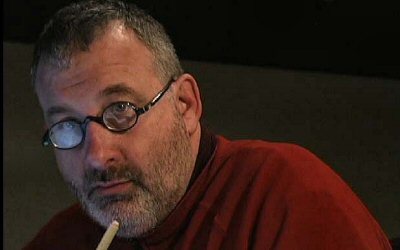
No, this isn’t Gus Spielberg, Steven’s younger, smarter brother who lives in Arizona — it’s Shoot “Em Up writer-director Michael Davis.
A noteworthy exception is Michael Davis, a Steven Spielberg lookalike whose success story is about one of the longest gestations in Hollywood history.
New Line has just committed to fund production of Davis’s script, a John Woo-type urban actioner called Shoot ‘Em Up, with Davis directing.
New Line president Bob Shaye has made it clear he wants the high-octane action flick rolling by September. He’s also signed Davis to a two-picture option agreement, and I’m told that Davis is now being wooed by agents for representation.
< ?php include ('/home/hollyw9/public_html/wired'); ?>
This is serious pay-dirt for a 1987 USC grad who’s directed a few lower-profile, straight-to-video films (the most admired is Eight Days a Week, winner of the audience award at the 1997 Slamdance Film Festival), and who has also worked as a storyboard artist off and on for roughly fifteen years, never quite putting his mitts on the brass ring.
I’ve read Shoot `Em up and it feels to me like a great New Line genre film in the tradition of The Hidden, the first Rush Hour, Blade and so on. It’s fast, punchy, sardonically funny, and aimed at younger guys and connoisseurs of action choreography-for-its-own-sake.
Journos are always being told that major stars are interested in playing a role in this or that script, but the talk is apparently valid this time. A serious “big name” is eye-balling Shoot `Em Up‘s lead male role, “Mr. Smith,” a terse hard-boiled type with the usual Joffrey Ballet abilities during gun fights.

A stick-figure image from Michael Davis’s 17-minute animatic Shoot ‘Em Up tape that conveys the choreography of the action scenes.
Why would a major star be looking at what sounds on the surface like a rote New Line actioner being made “for a price”? Because Shoot `Em Up ain’t rote.
The crusty, cynical noir-flavored tone is familiar, but the big action scenes have a kicky “haven’t been here before” quality. They take the Hong Kong Woo aesthetic to absurd new heights, but in a way that feels freshly insane, oddly logical and edgy-funny. It’s screwball formula nihilism with a twist.
Woo fans have seen a certain aspect of it before. The central Shoot `Em Up hook — a tough guy loner protecting a new-born baby boy from an army of goons trying to bring his just-begun life to a close — is borrowed from a sequence near the end of Woo’s Hard Boiled (’92).
Apart from the script itself, the element that sold Shoot ‘Em Up more than anything else was Davis’s decision to compose a 17-minute animatics reel, made from roughly 17,000 line drawings, which gives the viewer an idea of how the action scenes will play. (I could describe the action sequences and all, but this would spoil the fun down the road…right?)
I got a look at this tape last weekend and it definitely sells you on Davis as well as the piece itself. You figure any guy who cares this much about explaining how the action stuff will play has his gear wired tight and can be trusted to make it happen on film.
The people who pushed Shoot ‘Em Up into “go” project status are producer Don Murphy (along with his Angry Films team Rick Bennattar and Susan Montford, who will co-produce), New Line creative executive Jeff Katz and vp development Cale Boyter.
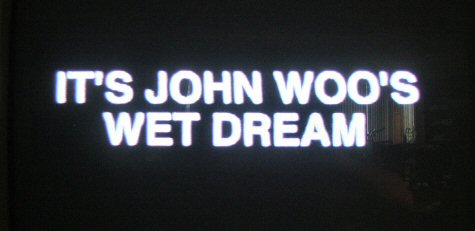
Copy insert from Davis’s animatic Shoot ‘Em Up tape.
Murphy had known Davis from USC film school in the late ’80s, and had kept in touch with him over the years. He knew he finally had something to push and maybe sell when Davis showed him the Shoot `Em Up script in the fall of ’03. It was hard and fast and could be made relatively cheaply…but Murphy wasn’t certain he could sell Davis as the director.
Murphy pushed it with New Line execs, although the first exec to make a call on it — senior vp production Stokely Chaffin — didn’t care for the “newborn baby dodging bullets” angle and said no. Murphy persisted and found an ally in Katz, who says he found the script “on the scrap heap…sometimes that’s how you find your little gems.”
Katz sent it along to Boyter, and the two of them eventually took it production chief Tobey Emmerich, who passed it along to Shaye.
Early on Murphy told Davis that “the biggest thing you can give me is some reason why [New Line] would let you direct it.” The animatics tape was the answer. “It said, look, he’s already visualized this thing, and look at how well these sequences play even with stick-figure drawings,” says Murphy. In so doing, Davis “really went the extra mile.”
Murphy knew Davis slightly “when I went to USC grad school in the late ’80s,” he says, “although he was two years ahead of me. He was one of those guys you meet and figure right away when they get out of school they’re going to be the schizzle. His shorts were great and he had an agent when he was still in school. But then we all got out and did what we did, and with Michael it was like…what happened?”
“I made some mistakes,” Davis says. “I was not politically savvy. I was an innocent and had no sense of politics and because I didn’t understand the political landscape in Hollywood, it hurt me. I always thought just sheer talent would be enough. I had an agent in film school. I could have gone with Richard Lovett or Jeremy Zimmer, but I went with a boutique agency instead.
“I also didn’t invest in networking and socializing. I just didn’t follow up on meetings. I guess I’m such a perfectionist….I didn’t want to just call up and be the fuller brush man, and I had too much self-doubt to just put myself out there and call these people.

“Stacy Sher at Jersey tried to help me get my first agent, and she’d take me out to lunch, wondering what I’d be doing. I didn’t keep up with her. I didn’t return the effort she put into me.”
The balancing factor was Davis’ way with a stand-out concept or oddball scene.
For Eight Days a Week he came up with the idea of a young horny protagonist having sex with food (i.e., shtupping a watermelon). If you ask me this bit was ripped off by the makers of American Pie. (How could the Weitz brothers claim otherwise?) Davis says he was “up” for directing that film until a certain Universal executive remembered the studio’s “mandate for hiring 25 year-old directors! I was too old…I was in my 30s!”
(John Hughes, one of Hollywood’s most successful miners of the teen aesthetic, was in his 30s when he made all those ’80s teen comedies. He turned 40 in 1990.)
Davis was a year or two ahead of Murphy at USC, graduating in ’87. He was a bit more contemporary with Jay Roach, Steven Sommers, Michael Lehman, John Turtletaub.
Davis has written 33 screenplays (ten of them produced) and directed five movies based on his scripts, the best of these being Eight Days a Week and 100 Girls, which went to video in the U.S. and “opened on 100 screens in France.” He’s done storyboard work for Pee-wee’s Playhouse and Tremors.
Murphy always “made me feel comfortable,” Davis recalls. “Over the years I’d send him my latest straight-to-video movie, and he always returned my phone calls. His attitude was always, ‘What can I do to help you?'”
It was a seven-month process, he says, before Shoot `Em Up got traction at New Line.
“Most producers shotgun things,” says Davis. “They send a script out, and if it doesn’t get heat they move on. Don is different.
“Jeff Katz liked Shoot ‘Em Up, but it stalled with Stokely. Don being Don, he wouldn’t let them pass on it. Katz loved the material..he was saying he’d never seen an action piece like this before. Then Cale Boyter saw it, got it and pushed it along. Then they all saw the reel.”
Davis “is not a young guy but this movie is happening and the agencies are going crazy for it,” says Katz.
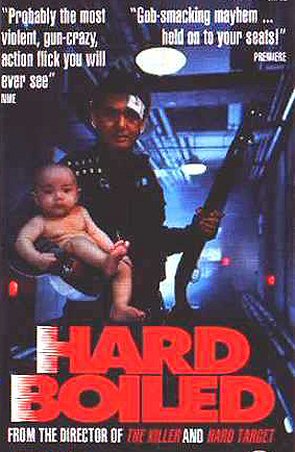
“[Murphy] told me I had to turn myself onto this. So we had a meeting with Davis and he looks like a pudgy Steven Spielberg. He’s this very happy-go-lucky guy, and what he did was map out a very inventive way to sell the gunplay. Shaye saw the tape and said yeah, this is good, get me the script.”
Writer-directors with talent, moxie and opportunistic backgrounds have about ten years to make their mark or establish a serious foothold of some kind after leaving film school. Most get there by their late 20s or early 30s. If they haven’t made it by 40 or thereabouts…toast.
Being a late bloomer myself (I didn’t really get down to journalism until I was 27), it’s nice to know that a slightly older guy has busted through, and for the right reasons.
Oscar Balloon ’05
Here’s the first assembly of ’05 Oscar Balloon picks. The same can be found down in the new mustard-colored Oscar Balloon box at the very bottom of the column.
Anyone with a line on any film or actor or behind-the-camera filmmaker of any stripe that they believe (and I mean on the basis of having read a script or actually having heard or been told something substantive, as opposed to hunches or assumptions) should be included, please forward the info and if it sounds credible, I’ll put it in.
BEST FEATURE: The Producers (Universal); All The King’s Men (Columbia); Untitled Spielberg Munich Olympics Project (Universal), Memoirs of a Geisha (Columbia); The New World (New Line); Jarhead (Universal), Elizabethtown (Paramount); Walk The Line (20th Century Fox); Cinderella Man (Universal); Syriana (Warner Brothers); Oliver Twist (Sony/Columbia).
BEST DIRECTOR: Steven Spielberg (Untitled Munich Olympics Project ); Ron Howard (Cinderella Man); Sam Mendes (Jarhead), James Mangold (Walk The Line), Terrence Malick (The New World); Rob Marshall (Memoirs of a Geisha); Roman Polanski (Oliver Twist).
BEST ACTOR: Matthew Broderick (The Producers); Viggo Mortensen (A History of Violence); Colin Farrell (Ask The Dust; The New World); Joaquin Phoenix (Walk The Line); Jake Gyllenhaal (Jarhead), Russell Crowe (Cinderella Man), Johnny Depp (The Libertine); Sean Penn (All The King’s Men); Eric Bana (Unititled Spielberg Munich Olympics Project).
BEST ACTRESS: Cameron Diaz (In Her Shoes); Gwyneth Paltrow (Proof), Zhang Ziyi (Memoirs of a Geisha); Reese Witherspoon (Walk The Line); Salma Hayek (Ask The Dust).
BEST SUPPORTING ACTOR: Nathan Lane (The Producers); Jamie Foxx (Jarhead), Peter Sarsgaard (Jarhead), Ben Kingsley (Oliver Twist); Paul Giamatti (Cinderella Man); James Gandolfini, Anthony Hopkins, Jude Law (All The King’s Men).
BEST SUPPORTING ACTRESS: Susan Sarandon (Elizabethtown); Hope Davis (Proof, The Weather Man); Toni Collette, Shirley MacLaine (In Her Shoes); Kate Winslet, Patricia Clarkson (All The King’s Men).
BEST ORIGINAL SCREENPLAY: Terrence Malick (The New World); Cameron Crowe (Elizabethtown).
BEST ADAPTED SCREENPLAY: Mel Brooks and Thomas Meehan(The Producers); Stephen Gaghan(Syriana), Steve Zaillian (All The King’s Men), William Broyles, Jr.(Jarhead), Susannah Grant (In Her Shoes).
Brando Blow-off
“You’re absolutely right about Brando getting short shrift at the Oscars. At least they kept the show reasonably brisk, but a full-up Brando tribute wouldn’t have consumed that much more time.” — Jay Smith
“I felt exactly the same way about Brando — he was robbed. It was insulting and stupid. Anything to do with Brando refusing to take his Oscar in ’73? An oversight? Who is responsible? They had a great opporunity to salute a legend and they lost it. Imagine the quotes they could have got from all the living Oscar-winning actors…De Niro, Pacino, etc. Shameful.” — Dale Launer, director-screenwriter.
“Maybe he wasn’t liked, maybe he didn’t play the game, maybe he took some air of the idea that someone could walk away…but tell me who did more for the performances and the quality of work that the whole night is supposed to be about? Oh right…Johnny Carson.” — Tom Van
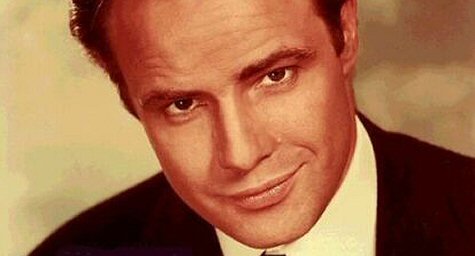
Marlon Brando
“You were right on target with your Brando comments. He’s probably the greatest thespian who has ever lived, and he delivered the best acting performance in cinematic history in Last Tango in Paris. I wonder if the oversight had anything to do with his personal troubles in his final years. If so, shame on the Academy.” — Ron Cossey
“Damned right they should have done a special thing for Brando, with Scorsese or somebody putting his complex and contradictory career into perspective. (Forget comedians– why doesn’t Scorsese just host the whole thing with commentary over the clips and footnotes at the bottom of the screen?)
“But Brando isn’t the only one who deserved that kind of separate attention– and I suspect this is the reason they didn’t do it. If they’d done one for him, it would have raised the question of why they didn’t do one for Ronald Reagan.
“By any decent logic, they should have acknowledged that a major place in history — not film history, but history– is held by someone who was once one of theirs. The problem, of course, is that a lot of people in Hollywood hated him as president, and if they were forced to recognize that maybe they were wrong then and that he did play a crucial role in ending a vast and terrible tyranny, they’d have to consider the possibility that they could be wrong about Bush and what’s happening in the middle east right now. And that, of course, won’t do.
“So instead of honoring either Brando or the man who said ‘Mr. Gorbachev, tear down this wall,’ the Academy chickened out by flashing them wordlessly on screen to bookend Fay Wray and Russ Meyer. But after all, how could we expect mere mortals like them to merit the level of loving tribute Hollywood reserved last night only for a true idealist and saint like the gulag-builder Che Guevara? Team America has never seemed more prescient.” — Mike Gebert.
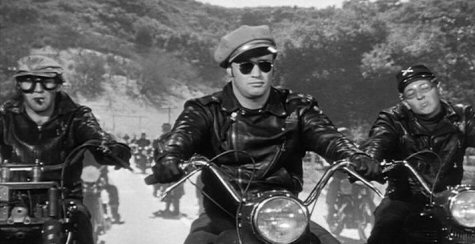
“It’s baffling to me that there was evidently no influential figure to push for a Brando tribute reel.” — Josh Martin.
“It seems clear to me that The Academy didn’t produce any special tribute to Brando because they didn’t feel they owed him anything. I can understand that. After all, he dissed them first. How could they give him special treatment after what he did while reducing other loyal members of the academy to a second each in a montage?
“Separate special memorials eat up too much time anyway. If they were that big a star (like Brando), they had enough press when they actually died. I had my fill of ’50s film clips of Marlon on MSNBC last summer. We didn’t need another review of his career last night. I can understand when they do it for Johnny Carson or Bob Hope because they had a special relationship with the actual Academy Awards TV program.” — P. Mccarthy.
Oscar Fallout
“I wasn’t looking forward to the Oscars this year, and almost didn’t watch for almost the first time I can remember. I’m not a fan of Chris Rock. But I did watch, and I enjoyed it, though it didn’t rank with the more memorable shows. Perhaps the straitjacket of the show actually made Rock funnier to me. You’re right about Johnny Carson, and, yeah, they should give Steve Martin whatever he wants next time.
“The Pepsi Spartacus commercial was such an affront to me that I will go out of my way to avoid Pepsi at all costs until the memory of that ad fades. Ugh. Sean Penn coming to Jude Law’s defense only seemed to play into the perception of him not having much of a sense of humor. Yeah, Clint should have been nominated for his M$B score. And yup, Collateral deserved more than a nod for Best Cinematography.
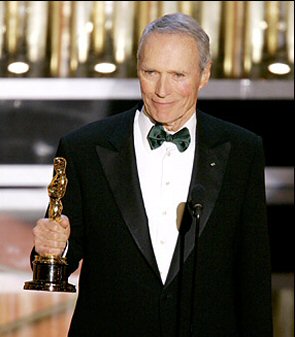
Clint Eastwood, director-producer of Million Dollar Baby and winner of the Best Director Oscar.
That The Aviator won is almost criminal, because the replication of early two-strip Technicolor processes left me scratching my head wondering if I was seeing a bad reel in the print when I saw the blue peas — and I’m a moviegoer who loved the Technicolor history documentary on the Robin Hood DVD! Who exactly got the homage to early color that they were doing? (I didn’t get it until I looked up the film’s trivia section at IMDB.) That conceit was the worst part of that movie. I had no problems with the CGI effects, and I’m usually pretty hard on that.” — Jay Smith
“The evening ultimately turned into a high mass for Clint Eastwood — the patron saint of on-time and under-budget filmmaking; the Hollywood trooper; the team player; the heartbreak kid; the poster boy for ageism in reverse; the proponent of simple storytelling for simple folk; the guardian against mass market/CGI-driven entertainment; the let’s-not-do-a-first-take,let’s-use-the-rehearsal-footage waste-management pro.
“I know you’re a fan of Million Dollar Baby but when it comes right down to it, the movie is nothing more than an old-fashioned melodrama torn from the pages of Warner Bros.’ own playbook from the 30s and 40s — only then they had actors with the grit and seeming street smarts to bring it all to vivid life: talents like Cagney, Bogart, Garfield, Pat O’Brien and the Dead End Kids. Now we have Clint playing Clint and Morgan Freeman tackling a role no different than all those serial killer movies at which he’s become so expert.” — Steve Chagollan
“Do you think that Collateral might have lost the cinematography Oscar because it was shot digitally? The images of LA at night were stunning, and to shoot so many scenes in the taxi…amazing work. That said, Robert Richardson√ɬØ√Ǭø√ǬΩs Aviator cinematography was worthy of the Oscar. The recreation of the Technicolor processes was amazing and the overall look of the film well worthy of the Award.” — Edward C. Klein, Salem, Oregon.
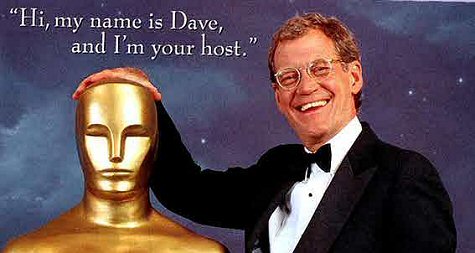
“I think the funniest moment at the Oscar in the last ten years was the Dave Letterman-hosted 1995 ceremony (a year that honored Forrest Gump and Pulp Fiction in different ways). There was that skit with several top names — Jack Lemmon, Martin Short, Paul Newman, Albert Brooks — acting to a sock monkey. The runner-up would be Billy Crystal’s intro to the 2000 ceremony, complete with Crystal spoofing Spartacus and showing up in drag as Mrs. Robinson.
— Michael Bergeron
“I can’t really stand it that so many people are crying over Eastwood not getting nominated for best score. Guarantee that if Lennie Niehaus wrote the same music note for note, no one would have cared (see Unforgiven). The real tragedy (well, not tragedy….life will go on) is that there were several great scores this year that came up empty in the awards department, while the five Oscar nominees ranged from okay to…okay.
Spartan, The Incredibles, I, Robot (the movie sucked but Beltrami knocked the music out of the park), The Motorcycle Diaries, Friday Night Lights and Kinsey are just a handful of great scores that went mostly unmentioned this year, yet everyone is crying over Eastwood’s ten notes. If he wasn’t going to win for Mystic River, he sure as hell wasn’t going to be recognized for Million Dollar Baby.
“It’s not even that the score was bad — it served its purpose. But there were far, far, far many better ones deserving of recognition, and now their composers have to sit around being told how Eastwood is superior to them too. If Danny Elfman or Carter Burwell haven’t won an Oscar yet, I think Eastwood can stand to miss out a few more times.” — Eddie Goldberger
Pepsi Spartacus
“So you liked Kirk Douglas and the gladiator army selling Pepsi — have you seen the ad with Gene Kelly’s Singing in the Rain remixed to sell VW Golfs? Here’s the link . The spot is pretty seamless, but I can’t help but cringe. I’ve been told that if I were to ever associate msyelf with something similar, I would be killed.
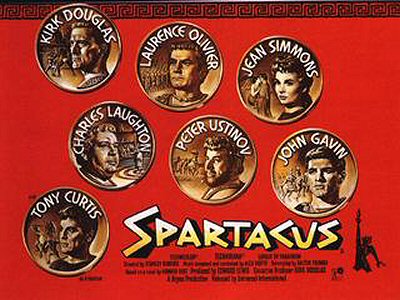

“Similar, but not selling anything, was the video mashup of the Beatles and Jay-Z. Someone took the initiative and blended A Hard Day’s Night footage with Jay-Z clips. Amusing if only to guess which Beatle would be the DJ and which was going to bust a move. [Editor’s Note: There was a link in this letter to the Jay Z video, but it didn’t work. If anyone has found one that works, please send it along.] — Chris Clark
Day and Date
“DVD’s or pay-per-view simultaneous with a theatrical opening sounds like a dream come true to me.
“Theatres won’t die out — they’d just be thinned out. Then maybe
a large percentage of the annoying crowd (families with 30 children in tow, talkers, etc.) would stay home. It’d be cheaper to rent a flick for $12 then it would be to pay admission for every child in your neighborhood. Ticket prices would go up, sure, but then maybe the quality of the experience would too.
“I’ll be honest — it’s getting harder and harder to pay upwards of $10 a person to see a movie maybe three days into the run and already there are a ton of scratches, pops and cigarette burns, not to mention faulty sound equipment. The experience is about as good sometimes for big budget fare in the theatre as it would be in my living room.” — Shawn Robare.
Asian Bootlegs
“Consider two developments regarding bootleg DVDs here in Asia:
“Movies open here on Thursdays…. the co-ordinated global released films actually get shown here one to two days sooner than the USA (by the time difference). The ticket prices vary from $2 to $8 for the equivalent service of a first class international flight (electric reclining seats and waitress service).
“I don’t subscribe to the bootleg industry, but apparently the bootlegs are now ‘off the master’ and nearly as good as the released DVD. Somebody is selling out at the major studios. I saw a snippet of a friend’s Million Dollar Baby copy and it was perfect.” — Paulus.

Crowds in Calcutta waiting for fresh shipments of pirated DVDs. Well, not really.
“You presented some interesting ideas about the future of film distribution. I for one would hate not to be able to see films on a big screen. I don√ɬØ√Ǭø√ǬΩt care how big a screen I have at home — I want the magical experience in a darkened theater.
“One scenario you didn√ɬØ√Ǭø√ǬΩt mention was digital projection. I haven√ɬØ√Ǭø√ǬΩt been able to see a film presented in this format, but from what I√ɬØ√Ǭø√ǬΩve heard it√ɬØ√Ǭø√ǬΩs stunning. If theaters start showing films this way and the films are worthy, just maybe people will start to fill the theaters again.
“Of course it doesn√ɬØ√Ǭø√ǬΩt help that they charge a small fortune to get in the door. My family and I wait until films come to the local Theater Pub where a ticket is $3 and you can enjoy dinner and a beer or glass of wine and see a decent film the way it was meant to be seen. And you don√ɬØ√Ǭø√ǬΩt have to put up with the poorly managed Regal Cinemas where all they want is your hard earned money and could care less if the film is focused or the sound is properly adjusted. And don√ɬØ√Ǭø√ǬΩt get me started on the conditions of the bathrooms!” — Edward C. Klein, Salem, Oregon.
Flipside
“I realize you liked Rock’s Oscar bit when he interviewed patrons at L.A.’s Magic Johnson complex. I’ve read a few other critics (including Tom Shales) who also seemed to like it. But you and Shales and the others may just be deluded honkies.
“Another interpretation of Rock’s interviews is that ‘urban’ audiences may just be completely out of touch with real cinematic quality. Unlettered, culturally limited boobs (as opposed, of course, to the hip, smarty-pants Rock). If a white guy had done those interviews, after all, the bit would have been correctly derided as racist, condescending and patronizing, as someone making fun of the less educated.
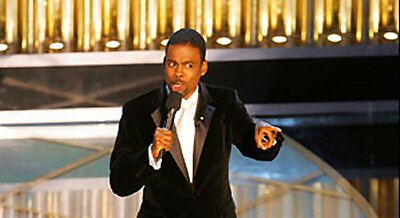
Chris Rock.
“But it’s better — okay, at least — if Rock (looking silly indded with earrings in both lobes) does it, right? Are you guys sure of that? And the presence of Albert Brooks is no guarantee either way that the skit was either racist or innocent. It just indicates how clueless Brooks himself may be about stuff like this.
“Good job on the Brando obit, by the way.
“Also, do you really imagine that, say, five years ago when you’re in a Mexican restaurant and there’s a mariachi-type version of this year’s winning song, you’ll truly remember it? I think not. Indeed, I don’t think any of us will remember any of the nominated songs one year from now.” — Richard Szathmary.













